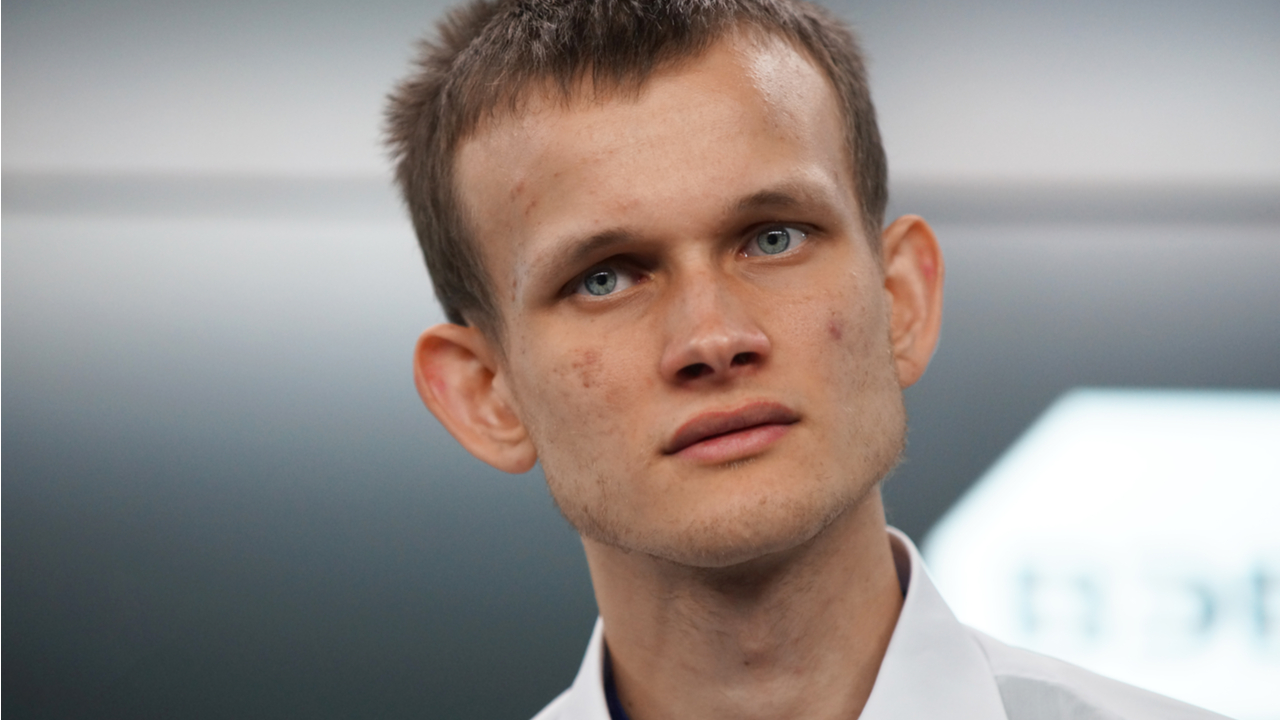
Ethereum (ETH) co-founder Vitalik Buterin says he has a desire to see Ethereum become a system more akin to Bitcoin (BTC). Buterin recently took to Twitter to outline some of the contradictions he perceives between his “thoughts and values” that he doesn’t feel like he’s resolved relating to crypto. Contradiction between my desire to see […]
The post Vitalik Buterin Says He Wants Ethereum (ETH) To Become a ‘Bitcoin-Like’ System – Here’s What’s Stopping Him appeared first on The Daily Hodl.

Ethereum founder Vitalik Buterin says he supports a suggestion on how to reimburse holders of TerraUSD (UST) following the massive collapse of the Terra ecosystem last week. Originally put forth by a Twitter account named PersianCapital, the suggestion involves prioritizing the smallest holders in order to make them 100% whole after losing their funds to […]
The post Ethereum Founder Vitalik Buterin Supports TerraUSD (UST) Recovery Plan That Prioritizes Small Holders appeared first on The Daily Hodl.

Vitalik Buterin has called for relief for the average UST smallholder who got lured in by promises of high stablecoin yields by crypto influencers.
Ethereum co-founder Vitalik Buterin thinks that the beleaguered Terra (LUNA) project should prioritize small hodlers as part of any proposed reimbursement plan.
As widely reported, the Terra eco-system suffered a death spiral around May 9 which resulted in LUNA tanking 100% and the Terra USD (UST) stablecoin losing its USD peg (priced at $0.16 at time of writing).
With LUNA and UST investors reeling from substantial losses, the community is now looking at ways to reestablish the ecosystem and potentially offer relief to the many people who got burned financially.
One such community proposal — assuming the UST dollar peg is eventually stabilized — is to first reimburse all of the initial deposits (not yield) of small UST holders to “greatly improve general morale and sentiment” while figuring out how to sort creditors and larger investors later. The payout is estimated to cost between $1 billion to $1.5 billion.
Buterin showed support for the idea via Twitter on May 15, noting that the focus should be on the smaller investor who needs the money, before going a step further by suggesting that the whale hodlers should cop the loss:
“Coordinated sympathy and relief for the average UST smallholder who got told something dumb about ‘20% interest rates on the US dollar’ by an influencer, personal responsibility and [sorry for your loss] SFYL for the wealthy.”
While the Ethereum co-founder didn’t explicitly call for regulation, he did highlight that potential cover such as financial deposit insurance could be useful in these circumstances.
“An interesting unrelated one is Singapore employment law. Stronger regulation for low-earning employees, and a more figure-it-out-yourself approach for the wealthier. IMO things like this are good hybrid formulas” he said.
The obvious precedent is FDIC insurance (up to $250k per person)
— vitalik.eth (@VitalikButerin) May 14, 2022
An interesting unrelated one is Singapore employment law. Stronger regulation for low-earning employees, and a more figure-it-out-yourself approach for the wealthier.
IMO things like this are good hybrid formulas. pic.twitter.com/25XkfE8UVc
At this stage, it is unclear if the project will be able to rebuild, or if it will aim for a temporary resurgence to recoup investor losses, however difficult that may be. It is also worth noting that the proposal relating to Buterin’s comments was updated over the week, and is now weighing up paying out all users up to a per-wallet cap of $50,000.
Related: Buterin donates $4M to Uni of NSW for pandemic detection tool
Another idea being floated around online is to develop a hard fork upgrade for the Terra blockchain dubbed “TERRA 2”, while also launching a liquidity pool to bring UST back to its peg.
Binance founder and CEO Changpeng Zhao slammed this notion over the weekend, however, noting on Twitter that “forking does not give the new fork any value. That's wishful thinking.”
Prior to the LUNA and UST crash, the Luna Foundation Guard held around $2.7 billion worth of Bitcoin (BTC), and in reference to the pool idea to rebuild UST, CZ also questioned “where is all the BTC that was supposed to be used as reserves?”
Personal opinion. NFA.
— CZ Binance (@cz_binance) May 14, 2022
This won't work.
- forking does not give the new fork any value. That's wishful thinking.
- one cannot void all transactions after an old snapshot, both on-chain and off-chain (exchanges).
Where is all the BTC that was supposed to be used as reserves? https://t.co/9pvLOTlCYf
Terraform Labs founder Do Kwon — who resurfaced online late last week — has also proposed a reconstitution of the Terra blockchain to reset “network ownership” and distribute 1 billion LUNA tokens to the community.
Kwon’s proposed “Terra Ecosystem Revival Plan” however has seen strong pushback from popular figures in the crypto community such as Dogecoin co-founder Billy Markus, who has called for Kwon to leave the sector and also noted:
“If they wanna pay off the victims of their dumbass failed protocol, instead of using new money from new victims, they should use the money they already funneled from investors to pay them back.”

“Imagine if someone had detected COVID-19 before it spread around the world – that is our vision,” said professor Raina MacIntyre.
Ethereum co-founder Vitalik Buterin has donated $4 million worth of USD Coin (USDC) to the University of New South Wales (UNSW) to support the development of a pandemic detection tool.
The capital, which equates to roughly $5.3 million Aussie dollars, is part of Buterin’s self-described “moonshot anti-COVID effort” dubbed Balvi Filantropic Fund in partnership with the Shiba Inu memecoin project (SHIB) and Crypto Relief.
The funds will further support the development of the OISNT-based EPIWATCH tool which utilizes artificial intelligence (AI) and open-source data to create early pandemic warning signs.
Created by Kirby Institute Professor and Biosecurity Research head Raina MacIntyre the tool scans millions of items of publicly available online data, including social media and news reports to detect any changes that could suggest increasing health concerns.
Buterin emphasized the importance of sharing data in a decentralized and open manner to speed up pandemic detection:
“Open analysis of public data is an excellent alternative to more intrusive forms of monitoring, which are also often only available to governments and other high bidders but closed to the public.”
“By contrast, an open-source and open-access approach that allows researchers, including members of the public, to work collaboratively across the world can be more easily improved and scaled to detect new pandemics wherever they begin,” he added.
The funding will be allocated to the freshly named Shiba Inu Open-Source Intelligence (OSINT) Initiative led by UNSW’s Kirby Institute.
#Ethereum co-founder @VitalikButerin has gifted UNSW $5.3 million in #cryptocurrency to support the development of a #pandemic detection tool designed by @KirbyInstitute's Prof Raina MacIntyre.https://t.co/aYYhI1iQwR pic.twitter.com/Gy0l1xejel
— Kirby Institute, UNSW (@KirbyInstitute) May 12, 2022
Professor MacIntyre said the idea was to make the tool accessible at a “grassroots” level and make sure it covers enough languages to reach “villages and small towns around the world.”
“Imagine if someone had detected COVID-19 before it spread around the world — that is our vision. Using AI and real-time open-source data, EPIWATCH does not depend on people making reports. It is a great equalizer and can overcome weak health systems and censorship.”
Earlier this month, the Balvi Balvi Filantropic Fund announced its first round of financial support for various projects and organizations that are building COVID and pandemic prevention technology.
Related: Buterin: L2 transaction fees need to be under $0.05 to be ‘truly acceptable’
There were four recipients in total for the first round, including the open-source vaccine development RADVACproject, the Upper Room UVGI Project working on UV lamps that “zap viruses to death”, Active IAQ’s air filter initiative and Patient-Led’s long COVID symptom research.
The future of bio-defense is decentralized, open, collaborative, and actually doesn't require infringing on millions of people's livelihood and freedom. But it does require dedicated smart people to be supported in their hard work on making these tech solutions happen.
— vitalik.eth (@VitalikButerin) May 5, 2022

Despite Layer-2s offering relatively cheap transactions, Vitalik Buterin said that all transactions need to be under $0.05 to be truly acceptable.
Ethereum (ETH) co-founder Vitalik Buterin believes that Layer-2 transaction fees need to be under $0.05 to be “truly acceptable.”
Buterin made the latest comments in response to a Twitter post from the Bankless podcast host Ryan Sean Adams, who shared a screenshot of the average transaction fees for eight Ethereum Layer-2 platforms.
The data is from L2fees.info, a website that compares the cost of Ether’s Layer-1 network in comparison to Layer-2s built on top of it.
The only Layer-2 to meet Buterin’s desired transaction fee under $0.05 is the Metis Network at $0.02, however a token swap on the platform still costs $0.14. Fees sharply increase from there, at $0.12 per transaction on Loopring and going all the way to $1.98 per transaction on the Aztec Network.
Ethereum’s Layer-1 is relatively affordable at present at $3.26 per transaction and a whopping $16.31 per token swap, however that only lasts until Yuga Lab’s releases another collection of NFTs where fees can skyrocket to $14,000 per mint.
Adams emphasized the importance of Layer-2s for keeping Ethereum affordable, noting that “this is Ethereum and it's not expensive,” but Buterin suggested it wasn’t there yet:
“Needs to get under $0.05 to be truly acceptable imo. But we're definitely making great progress, and even proto-danksharding may be enough to get us there for a while!”
Needs to get under $0.05 to be truly acceptable imo. But we're definitely making great progress, and even proto-danksharding may be enough to get us there for a while!
— vitalik.eth (@VitalikButerin) May 3, 2022
Buterin’s affordable transaction goal is a long held one that he first stated during an interview in 2017 that “the internet of money should not cost more than 5 cents per transaction."
In January, Buterin said he still stood by this goal “100%” as part of a lengthy Twitter thread going over some of the key things he’s said or written over the past 10 years.
“That was the goal in 2017, and it's still the goal now. It's precisely why we're spending so much time working on scalability” Buterin said.
Related: ETH gas price surges as Yuga Labs cashes in $300M selling Otherside NFTs
The proto-danksharding or EIP-4844 that Buterin referred to as putting downward pressure on fees in his response to Adams, is a recently proposed upgrade to Ethereum that will see key elements of danksharding — a new and simplified design of previous sharding designs — implemented onto the network without any sharding upgrades being initiated.
Proto-danksharding will enable a new type of transaction dubbed the “blob-carrying transaction” that carries an extra 125KB worth of data (blob) that cannot be accessed by the Ethereum Virtual Machine (EVM). The general idea is that this will help the network scale significantly in the short term while reducing congestion and competition for gas usage, thus lowering gas fees.
“Because validators and clients still have to download full blob contents, data bandwidth in proto-danksharding is targeted to 1 MB per slot instead of the full 16 MB. However, there are nevertheless large scalability gains because this data is not competing with the gas usage of existing Ethereum transactions,” Buterin wrote in a blog post last month.
While Ethereum’s roadmap is notoriously flexible the shard chains upgrade is slated for sometime in 2023 well after the merge of the Mainnet with the Beacon Chain.
Shard chains provide avenues to horizontally and cheaply store data across the network, which in turn spreads the load, reduces congestion and increases transaction speeds. Both Ethereum and its Layer-2s are expected to benefit from this dramatically.

Blockchain and virtual currencies are set to become vital part of the Argentine capital’s 12-step digital transformation effort.
The capital of Argentina and an agglomeration with more than 12 million citizens, Buenos Aires will make blockchain a vital part of its digitalization drive. Specifically, the city will accept public financial transactions in crypto.
As city Mayor Horacio Rodríguez Larreta revealed in his Steve Jobs-styled presentation on April 25, the 12-step development plan titled “Buenos Aires +” envisions a significant increase in crypto and blockchain adoption.
Con Buenos Aires + vamos a dar un paso más en el camino hacia un Estado facilitador que desburocratice y agilice los procesos. Un camino en el que el Estado sea el que se acerca a la gente, y no al revés. pic.twitter.com/yi6fUMmAUI
— Horacio Rodríguez Larreta (@horaciorlarreta) April 26, 2022
The city authorities intend to launch a platform for citizens’ digital IDs that will hold all the necessary information, such as birth dates and vaccine certificates, medical records, education documents. To make sure that such sensitive data is well-protected, the platform will run on distributed ledger technology (DLT). As Larreta emphasized in his speech:
“All that information stream, which will widen in a geometrical progression, will be protected by blockchain technology [...] We are going to become the pioneers of that technology adoption so the users could control their data on their own.”
The move would mark the second step out of 12 towards the digitalized Buenos Aires. What’s even more intriguing is that the ninth step entails the option for citizens to pay their taxes in cryptocurrencies. While the city, itself, won’t hold crypto on its public accounts, it will convert the citizens’ cryptocurrency transactions into Argentinian pesos.
As Buenos Aires’ Secretary of Innovation and Digital Transformation Diego Fernández specified in a separate statement, the city is going to partner with local crypto exchanges, such as SatoshiTango, Buenbit, Ripio and Belo, to facilitate such payments.
In December 2021, Ethereum founder Vitalik Buterin visited Buenos Aires during Web3 protocol The Graph’s launch anniversary. On that sojourn, he had a meeting with the former president of Argentina, Mauricio Macri, who also happens to be the ex-mayor of Buenos Aires and Larreta’s fellow member at the “Republican Proposal” party.
 The internet entrepreneur and former CEO of Twitter, Jack Dorsey, claims if developers are building on Ethereum they have “at least one, if not many, single points of failure.” The statement was in response to Vitalik Buterin’s commentary concerning Elon Musk running Twitter. Former Twitter CEO Criticizes Projects Building on Ethereum Jack Dorsey doesn’t seem […]
The internet entrepreneur and former CEO of Twitter, Jack Dorsey, claims if developers are building on Ethereum they have “at least one, if not many, single points of failure.” The statement was in response to Vitalik Buterin’s commentary concerning Elon Musk running Twitter. Former Twitter CEO Criticizes Projects Building on Ethereum Jack Dorsey doesn’t seem […] Ethereum co-founder Vitalik Buterin has been granted Montenegrin citizenship. Buterin joins other members of the crypto community with global experience who have been invited to help the small Southeast European nation attract investments and develop its blockchain sector. Vitalik Buterin Obtains Montenegrin Passport Prominent crypto figure Vitalik Buterin is now a citizen of Montenegro, the […]
Ethereum co-founder Vitalik Buterin has been granted Montenegrin citizenship. Buterin joins other members of the crypto community with global experience who have been invited to help the small Southeast European nation attract investments and develop its blockchain sector. Vitalik Buterin Obtains Montenegrin Passport Prominent crypto figure Vitalik Buterin is now a citizen of Montenegro, the […]